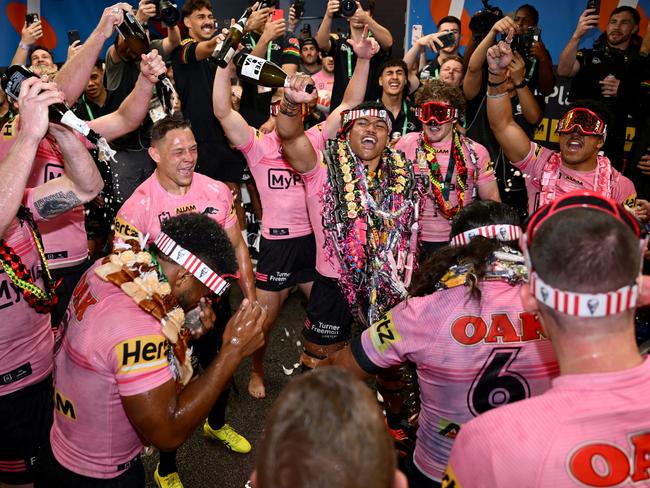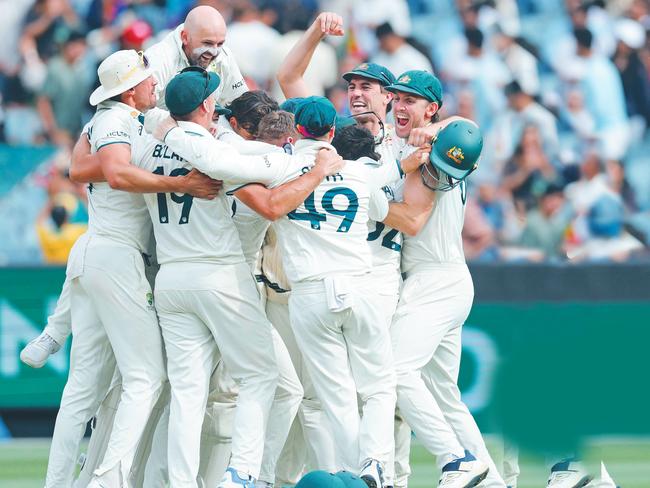Yes, it’s real, and we’ve got it: the footy blues
Sports fandom is essential to human psychological needs, the experts say. So how do rugby league fans cope during the off-season?
The symptoms arrived quickly.
It all began with an immediate listlessness, a draining of motivation and a sluggishness that became more pronounced as the evening went on.
This was followed by weeks, then months of joylessness. This affliction, if you remember those old Looney Tune cartoons of yesteryear, was akin to walking around with a small but permanent rain cloud above your head.
I remember the moment exactly because my teenage daughter and I suffered this affliction at precisely the same minute.
It was mid-evening on Sunday, October 6, 2024, when the Penrith Panthers defeated the Melbourne Storm in the NRL Grand Final at Sydney’s Accor Stadium. Just as Panthers star Jarome Luai took the final tackle of the match – in slow motion from memory – and the hooter sounded, my daughter and I saw purple and pink spots before our eyes.
We could barely lift ourselves off the couch, the siren still baying in the backs of our minds like the portent of a migraine. Both of us departed the room without a word, shivering at the prospect of what was to come.

The rest of the family remained immune.
But not me and Daughter No.1. As the only genuine diehard rugby league fanatics in the house, we knew what was coming but could do nothing to prevent it. It hits us annually, regular as clockwork, like a tonne of tackle bags.
Post football season blues.
Snort and mock all you like – PFSB, at least for us, is no joke.
No.1 is a genuine student of the game. She is already a formidable tactician and master of the rules of rugby league. You’d swear she’s memorised NRL Laws & Interpretations. Take section 14 (3): A player is considered “downtown” when: a player who is in front of the kicker in general play who intentionally advances beyond the point of the previous play before the ball has gone past him.
Chicken feed to her. So there.
If she witnesses even a microscopic refereeing error she’s on her feet, blowing her metaphorical whistle, shaking her clenched fist at the screen, and is often a minute ahead of the professional match commentators in her eerily granular analysis. So there.
But PFSB is serious, inexplicable to the non-sufferer, almost ungraspable by medical experts, academics and even Dr Google.
For what follows the last game of the year is an almost five-month vacuum – between early October and early March – of excruciating, mind-numbing, teeth-grating tedium that finds its way into almost every crack and crevice of daily life.
What follows – and let the nay-sayers begin howling here – are endless games of cricket with all that ball-rubbing and willow-wielding and pitch-cracks and duck-quacking and waiting, waiting, waiting. (You mean to say a game takes not 80 thrill-packed chock-a-block minutes but FIVE DAYS?) Then there’s the growling and grunting of tennis, and a time-out for a bothersome toenail injury – poor diddums – in a thwock-fest that could drag on for five hours. Not to exclude a four-day golf tournament. Here’s a game during which you could literally watch the grass grow in favourable meteorological and geological conditions.
Each year my daughter and I tumble down this same rabbit hole, our world view dampened, our enthusiasm restricted. Christmas Day? Meh.
This is serious business.

On Speaking of Psychology, the official podcast of the American Psychological Association, sports fan expert Dan Wann of Murray State University in Kentucky says sports fandom is essential to human psychological needs.
“What is critical is the extent to which the person does identify with (a) team,” he says in an episode of the podcast. “A term that we will often throw out there in sports psych is team identification, which is simply the extent to which the fan feels some type of psychological connection to the team. How much is the team an extension of the fan? How central is that team and being a fan of that team to their own self or social identity? And what we found is across multiple studies and multiple levels of competition from youth sports, college sports, high school sports, all the way up to major professional sports in the Olympics, is that the more the fan is identified with a local team, the greater that individual is likely to have a well-rounded sense of psychological health, lower levels of loneliness, lower levels of alienation, a higher sense of self-esteem, less social isolation.”
Hear, hear, Professor Dan.
A sports survey in 2023 conducted by Forza Football looked in part at participants’ reactions to the poor performance of their favourite team – in this case, soccer – and how it affected their health and wellbeing.
More than 27 per cent experienced anger at a substandard performance. More than 20 per cent experienced despair. Almost 9 per cent suffered respectively a lack of energy and a loss of interest in previously enjoyed activities.
Overall, more than 65 per cent of fans felt the performance of their favourite club affected their sense of wellbeing and equilibrium.
Two decades ago (and there’s every reason to believe the figures quoted here have increased over time) a British survey by Barclaycard found that 9.2 million people “in the UK will experience symptoms of depression and withdrawal during the summer months because the absence of regular competitive football leaves a void in their lives”.
The survey cited what it described as a “new psychological condition dubbed End of Season Affective Disorder”, with symptoms including mood changes, lack of focus, “feeling of a void”, and inclination towards “unsociability” and a lack of direction in life.
Barclaycard, responding at the time to these disturbing findings, disseminated Summer Survival Packs that included mini footballs, a footy magazine and beverages.
I searched the ever-trustful internet to try to understand this inter-season malaise and came across a report in Psychology Today by a Dr Glenn Sullivan describing a condition called anhedonia, which, in his words, “we clinicians lamely define as a decreased ability to experience pleasure … to the anhedonic individual, the world can literally look grey, food might taste like ashes, a friendly hug could feel like a vice. As people age, they often experience an increase in depressive feelings. One reason for this is that their sensory acuity is decreased: Objects in the world don’t look as sharp, and perhaps, not as beautiful. Flowers do not smell as sweet.”

And while I wouldn’t describe my and Daughter No.1’s condition as that nihilistic, I know we are not alone in our footy blues.
In the plant world we would be annuals. In summer and autumn we’re alive and spectacularly colourful and give pleasure and joy to all around us. Then we go dormant. Me and Daughter No.1, we’re the pansies of the annual sporting cycle.
According to Angelos Halaris, a medical director at the Loyola University Chicago Stritch School of Medicine, post-season withdrawal is very real.
Halaris reportedly offers tips on how to cope with the void, including not going cold turkey but watching game replays “in gradually diminishing amounts, sharing your feelings of withdrawal and getting back on the proverbial horse”.
“You’re just going to have to basically tough it out until football starts up again,” the good doctor says.
Just this week I saw No.1 Daughter’s spirits marginally lift.
Her favourite rugby league team (in fact, she has three) was playing a pre-season trial and she watched a livestream of the game, irrespective that it was played on a substandard suburban oval in the middle of Bottomfluff, Nowhere, and that the commentary was so poor that it proved hilarious. For example: “They should win this game if they keep attacking with their defence.”
Which was almost as good as a clanger a couple of seasons back from former Brisbane Broncos great and football commentator Gorden Tallis, describing a talented young footballer as “a fresh of breath air”.
We savoured the US Super Bowl, of course, but it was nothing but a teaspoon of stevia considering the all-you-can-eat buffet that is rugby league. (And yes, AFL too at a pinch.)
Still, the footy world is once again warming up, rising from its slumber as we long-suffering fans careen towards round one of season 2025 in early March.
The flowers are starting to smell very, very sweet.





To join the conversation, please log in. Don't have an account? Register
Join the conversation, you are commenting as Logout